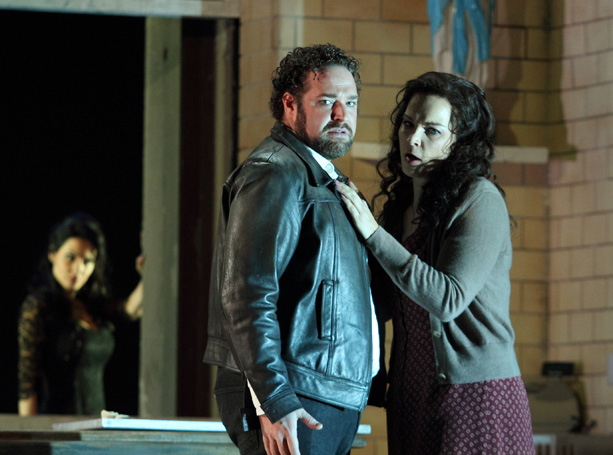Review: Cavalleria rusticana and Pagliacci (Royal Opera House)
The most popular double bill in opera, fabulously sung in a triumphant revival

© Catherine Ashmore
I need to do some Christmas shopping, so save me a bit of time and read what I thought when this brilliant production first appeared two years ago. Just the first four paragraphs. Look, here’s a link. My comments then still apply, because Damiano Michieletto‘s account of opera’s favourite double bill has been lovingly recreated for its first revival by Rodula Gaitanou.
The wonder this time round is the casting, which is so distinguished it’s practically regal. Doubts were expressed in some quarters about the choice of Elīna Garanča, a creamy-lyrical mezzo, for the soprano role of Santuzza, but at the performance of Cavalleria rusticana I attended (number three of the run) the Latvian diva delivered a gut-wrenching, unbuttoned night of prime verismo. Garanča is a grand international star who appears too rarely on these shores, so grab this opportunity to hear her.
Grab the bonus as well, which is two Bryan Hymel performances for the price of one. The American tenor, today’s leading exponent of the heroic-romantic repertoire and a welcome regular at Covent Garden, was originally engaged to sing Turiddu in Cav but the indisposition of Fabio Sartori, the announced Canio in Pag, has prompted him to shoulder that role as well. His two interpretations were a crucible of emotional extremes. The fervent bitterness of Canio’s "Vesti la giubba" earned at least one braying bravo over the applause, though it was his climactic descent into murderous insanity that truly stunned.
Simon Keenlyside is the third newcomer to a leading role, and as the gloating troublemaker Tonio he upends everyone’s happiness but his own. The British baritone has been patiently recovering from serious vocal problems in recent years but on this evidence he appears fully restored, that melting voice as expressive as ever and brimming with character.
The appearance of Daniel Oren on the podium is rarely a guarantee of enlightenment, but in fairness he kept this ship in sail for at least half the evening. His work on Cavalleria rusticana was unobjectionable; only in Pagliacci did he give a sub-par reading. That may be because he was conducting more for the singers than for the composer; but Leoncavallo’s score, while less melodic than Mascagni’s for Cav, has more fire in its belly and needs a maestro who’s also a dramatist. So while the big moments delivered the goods, intense sequences like Nedda’s love duet with Silvio were underpowered. That was no fault of Andrzej Filończyk, the committed Silvio, nor of Carmen Giannattasio who reprised her outstanding Nedda from 2015. They were simply deprived of an electrical charge from the pit.
Two fine casts, then, with excellent work from Martina Belli (Lola) and Luis Gomes (Beppe), and a returning performance of overwhelming grief from Elena Zilio as Mamma Lucia. The moment when she and Garanča wandered through the Pagliacci Intermezzo in an act of reconciliation – and closure on the unfinished business of Cavalleria rusticana – was the silent highlight of an evening that contained almost too many moments of magic.
Keep an eye on next year’s WhatsInStage Opera Poll; I’ll be surprised if this isn't up for Best Revival.
There are further performances of Cavalleria rusticana and Pagliacci, cast as above, on 12, 15, 19 and 22 December. The production returns, substantially recast, on 6, 9 and 13 January.













